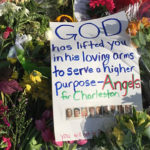What can Saturday Night Live teach us about forgiveness? SNL is not known for making serious apologies. Generally, their apologies are concealed in yet one more irreverent joke. But they took a different tack on Nov. 10.
I don’t watch the show, and not because I’m a church lady. One, it’s late on a “church night.” Two, it’s late. Three, I’m not as willing as I used to be to put up with a lot of coarse humor to find a truly funny morsel. What I know of SNL’s most recent apology I discovered the following Sunday and Monday in my Facebook news feed and in various op-eds.
The apology garnering so much attention
During the show on Nov. 3, Pete Davidson made a tasteless joke about Dan Crenshaw, elected to the U.S. House of Representatives by Texas’ 2ndCongressional District—an oddly-shaped crescent around the north side of Houston. In case you are not already aware, Crenshaw suffered the loss of his right eye in Afghanistan during his third combat tour when an IED exploded. He now wears an eye patch. Davidson’s joke took aim at that wound.
On the eve of Veterans Day one week later, Davidson took the opportunity to seek forgiveness in SNL’s typically irreverent fashion, which gave Crenshaw the opportunity to demonstrate a degree of forgiveness.
In a straightforward apology, Davidson said, “I made a poor choice last week … and on behalf of the show and myself, I apologize.” He went on to call Crenshaw “a war hero, who deserves all the respect in the world.”
After joining Davidson on stage, Crenshaw thanked him for “making a Republican look good.”
Unfortunately, the apology and forgiveness quickly devolved into—excuse the pun—an eye for an eye when Davidson allowed Crenshaw to make fun of a picture of himself as he had done with Crenshaw’s photo a week earlier.
The forgiveness worth more attention
“There’s a lot of lessons to learn here, not just that the Left and the Right can still agree on some things, but also this: Americans can forgive one another. We can remember what brings us together as a country and still see the good in each other,” Crenshaw said in his concluding remarks.
Indeed, there are lessons to learn here.
Sign up for our weekly edition and get all our headlines in your inbox on Thursdays
Whether or not Crenshaw’s was an adequate forgiveness, which some may question, what his stated forgiveness was without doubt was a bright spot in deeply contentious times exacerbated by some in the religious community.
In the months leading up to the mid-terms, the divide between the Left and the Right was accentuated by high-profile religious spokespersons on each side who demonized one another. Many of us, at the very least, got in a jab or two.
Of all the people in American society who should have demonstrated the ability to bring the country together in the months leading up to the mid-terms, it should have been us. Thankfully, some did work toward that end, but not enough of us did.
Now, a comic and a soldier show us how to come together. However imperfect their demonstration of forgiveness may have been, it was more than some religious voices did. And now the nation’s talking about it.
Can our forgiveness look like theirs?
Should Davidson and Crenshaw—or Americans, in general—be better at demonstrating forgiveness than followers of Christ? Davidson and Crenshaw, and not those who profess to have received much more profound forgiveness, are the ones being heralded now for showing us what forgiveness looks like.
The difference between what I saw in replays of Davidson and Crenshaw’s exchange compared with what I often see and hear one group of Christians say about another group brings to mind one of Jesus’ most chilling parables (Matthew 18:21-35), in which he told the story of an unmerciful servant. In the story, a master forgave a massive debt owed by a servant who begged for mercy. As thanks, this servant punished another servant who owed the first only a trifle.
When the master learned of the situation, he called the servant back and said, “Shouldn’t you have had mercy on your fellow servant just as I had on you” (Matthew 18:33)?
Too often, we have treated one another as being beyond forgiveness. Oh, we might say no one is beyond forgiveness, but the things we say about one another and the ways in which we refuse to fellowship with one another demonstrate to the world something different. What we have communicated all too well is that those who profess Christ but who believe differently than we do—whether to the left or the right of us—are not worth our mercy.
And if those who do not follow Jesus see his followers treat each other this way, are they likely to want Jesus’ forgiveness for themselves?
We were reconciled to God in Christ and called into the ministry of reconciliation, the ministry of bringing together under the lordship of Christ those who are separated by sin.
If a comic and a soldier can reconcile their broken relationship, surely those of us who follow the true Master of forgiveness can extend mercy to one another.
Eric Black is the executive director, publisher and editor of the Baptist Standard and a former pastor. He can be reached at [email protected] or on Twitter at @EricBlackBSP.














We seek to connect God’s story and God’s people around the world. To learn more about God’s story, click here.
Send comments and feedback to Eric Black, our editor. For comments to be published, please specify “letter to the editor.” Maximum length for publication is 300 words.